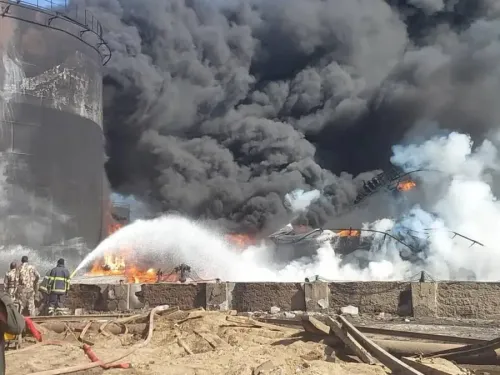Zimbabwe Reports 124 Cholera Cases in Latest Outbreak

Synopsis
Key Takeaways
- 124 confirmed cholera cases reported since November.
- 15 deaths linked to the outbreak.
- Mashonaland Central Province is the most affected.
- Need for more vaccines due to depleted stock.
- Inadequate water and sanitation infrastructure is a major issue.
Harare, March 15 (NationPress) Zimbabwe has documented 124 confirmed cases of cholera since the onset of the latest outbreak in November of the previous year, as stated by the Minister of Health and Child Care, Douglas Mombeshora.
During a press briefing in Harare, Mombeshora disclosed that the nation has recorded 15 confirmed deaths, 608 suspected cases, and 566 recoveries.
Out of the country’s 10 provinces, six have been impacted, with a significant number of recent cases emerging from Mashonaland Central Province, as highlighted by the minister.
Mombeshora noted that the majority of cases were discovered among artisanal miners along the Mazowe River and in the small agricultural town of Glendale within Mashonaland Central Province, according to reports from Xinhua news agency.
"Artisanal miners tend to migrate frequently, inadvertently spreading cholera. This has led to a consistent emergence of cases in Mashonaland Central Province, particularly along the Mazowe River where extensive gold panning activities are ongoing," he explained.
"We are exploring options to acquire additional vaccines as our current supply has been depleted. We only have approximately 4,000 doses remaining, which is insufficient for the affected regions," the health minister noted.
Mombeshora also pointed out that recurring cholera outbreaks continue to afflict Zimbabwe, largely due to inadequate sustainable water and sanitation infrastructure.
The World Health Organization states that cholera is an acute diarrheal illness caused by ingesting food or water contaminated with the bacterium Vibrio cholerae. It poses a global public health risk, reflecting disparities in social and economic development. Access to clean water, basic sanitation, and hygiene is crucial for preventing cholera and other waterborne diseases.
The majority of individuals affected by cholera experience mild to moderate diarrhea and can be treated with oral rehydration solution (ORS). However, the disease can escalate swiftly, making timely treatment essential for saving lives. Patients with severe symptoms require intravenous fluids, ORS, and antibiotics.
Cholera outbreaks are commonplace in certain nations, while in others, they are sporadic, sometimes years apart. Cholera is associated with limited availability of safe water, basic sanitation, and poor hygiene practices, often exacerbated by conflicts, population displacements, climate events such as cyclones, floods, or droughts, and insufficient investment in the maintenance and enhancement of WASH services and infrastructure.









